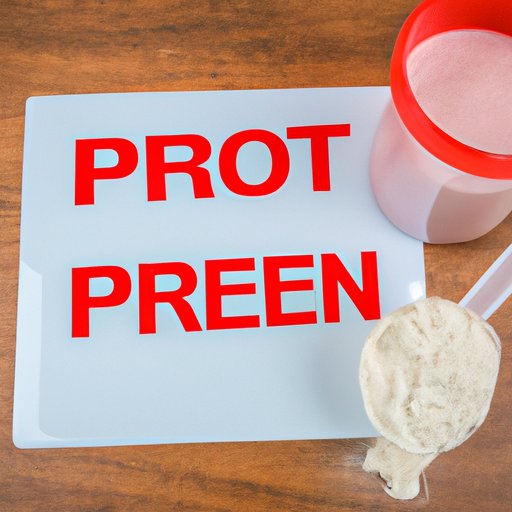
Introduction
Protein is a macronutrient that is essential for building and repairing tissues in the body. It is also a common supplement used for weight loss and muscle gain. However, many people are concerned that consuming protein without exercise may lead to weight gain. In this article, we explore the science behind protein and weight gain without exercise and provide strategies for consuming protein without gaining weight.
The Science Behind Protein and Weight Gain
When you consume protein, your body breaks it down into amino acids. These amino acids are then used to build and repair tissues in the body. However, when you consume more protein than your body needs, the excess protein can be stored as fat. This is because your body uses carbohydrates and fats as its primary energy source, and any excess protein is converted into glucose and then stored as fat.
Additionally, consuming high amounts of protein can lead to an increase in the hormone insulin, which can lead to weight gain. Insulin helps your body store excess glucose as fat, and consuming large amounts of protein can cause your body to produce excess insulin.
High Protein Diets and Weight Gain
A high protein diet is generally defined as a diet where protein makes up 25-30% or more of your total daily calorie intake. While consuming a high protein diet can be beneficial for weight loss and muscle gain, it can also lead to weight gain if not done properly. Consuming too much protein can lead to an increase in calories, which can lead to weight gain.
Additionally, consuming too much protein can lead to other health issues, such as kidney damage and dehydration.
Protein Sources and Weight Gain
Not all protein sources are created equal. Animal-based protein sources, such as meat, dairy, and eggs, tend to be higher in calories and can lead to weight gain if consumed in excess. Plant-based protein sources, such as beans, lentils, and quinoa, tend to be lower in calories and can be a better option for those trying to avoid weight gain.
The Importance of Exercise
While consuming high amounts of protein can lead to weight gain, exercise can help offset the effects and promote weight loss. Exercise helps to burn calories and build muscle mass, which can lead to an increase in metabolism and a decrease in body fat.
Additionally, exercise can help to prevent muscle loss that can occur when consuming a high protein diet without exercise. Muscle loss can lead to a decrease in metabolism, which can make it harder to lose weight.
Strategies for Consuming Protein Without Weight Gain
If you want to consume protein without gaining weight, it is important to balance your protein intake with other food groups, such as fruits and vegetables. Additionally, focusing on lean protein sources and avoiding high-calorie protein sources, such as red meat and full-fat dairy products, can help prevent weight gain.
One effective strategy for consuming protein without weight gain is to incorporate protein into each meal. This can help to keep you full and prevent overeating. Additionally, choosing protein sources that are low in calories, such as tofu, fish, and poultry, can be beneficial.
The Relationship Between Protein and Muscle Mass
Consuming protein without exercise can still lead to an increase in muscle mass. This is because the amino acids in protein are essential for building and repairing muscles. However, if you are not exercising, the increase in muscle mass may not be noticeable.
Building muscle mass can be beneficial for weight loss and weight maintenance. Muscle burns more calories than fat, so having a higher muscle mass can lead to an increase in metabolism and a decrease in body fat.
Conclusion
Consuming protein without exercise can lead to weight gain, but it is possible to consume protein without gaining weight by focusing on lean protein sources and balancing your protein intake with other food groups. Additionally, exercise can help to offset the effects of consuming high amounts of protein and promote weight loss. Remember to choose protein sources wisely and focus on building muscle mass to maintain a healthy weight.
By following these strategies, you can enjoy the benefits of protein without the unwanted weight gain.





